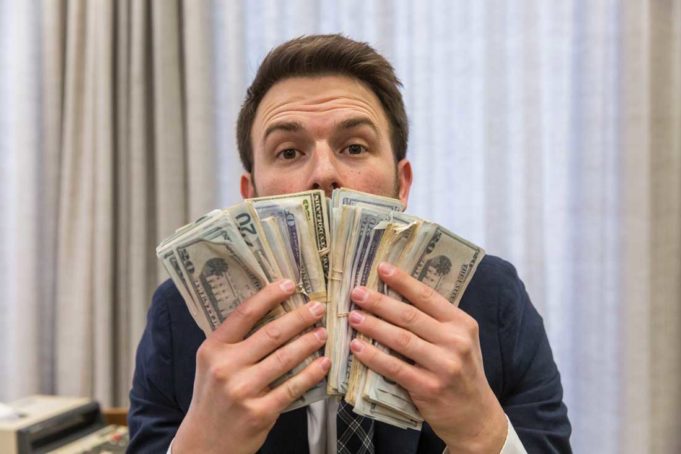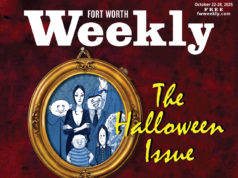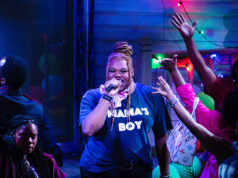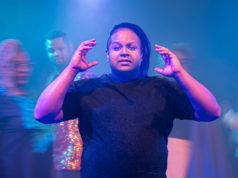Finding comedy in anxiety is laughably attempted by many, clinched by only a few. In The Trap, British playwright Kieran Lynn’s affinity for dark absurdism goes one shade darker, poking at the ethical line between borrowing and burglary at Amphibian Stage Productions.
Last October, I had the pleasure of sitting next to Lynn as he studied a cold reading of this script. Justin Lemieux, who played a profoundly flat Tom in Lynn’s Crossing the Line last summer, read the lines of Arthur, an equally static male lead in The Trap whom audiences can’t help but like. In both plays, other characters orbit around these male leads for moral centering. When I asked Lynn about his predilection for such typecasting, he said, “I seem to like the dynamic of a stronger woman and a weaker man.”
For this reason, I suspect most Cowtown theatergoers will favor Lynn’s newest play, this one on predatory lending policies.
After business hours at Debt Duck, a payday loan office, a young couple, Arthur (Lemieux) and his girlfriend Clementine (Sarah Rutan), enters with the intention of stealing a few grand from a safe, feeling as though it’s owed to one of them. With the accidental triggering of an oddly conversational alarm system, the office branch manager, Alan (Bob Hess), arrives at the scene. Alan is forced to confess his desperate need for the money that the couple has stolen, inciting harsh judgment from Clementine, who’s hardly ready to hand over the cash she’s claimed. Everything changes, though, when the company’s regional manager Meryl (Cara Serber) makes a surprise appearance at the scene of the crime.
In Lynn’s leading role of male ingénue — or might we say “mangénue?” — Lemieux’s acting enchanted the audience, once again. A guileless guy any audience will adore, especially when his co-actors bring so much bite, Lemieux makes a rather flat character fun to follow. Opposite him, Rutan’s strong female lead came fast and fierce with her lines, perhaps too much so toward the beginning of the show, throwing off the strong-woman to weak-man ratio that Lynn designs in this dialogue. The danger of a play like Lynn’s, one stuffed with an abundance of solid one-liners, is that his cleverness can be lost on a character like Clementine when passion overpowers pacing. Or as I recall Lynn saying last fall, “When you’re dealing with comedy, you need to give people small periods of breath to not laugh.” It’s difficult to pen in a pause, but Lynn’s accounting for musical time lapses weren’t wasted on Director Mary Catherine Burke, who added breathiness to this play by way of entertaining transitions.
As the other female-male duo onstage, Serber and Hess foiled Lemieux and Rutan in their roles and in their rapport with one another. Serber capitalized on every line and showed the most overall character development, coming on stage with all the agreeableness of a seasoned salesperson and exiting even more hypocritically. The slimy spinelessness of Hess was steadier in nature, like Arthur, and at his most hilarious when miming the confident gestures of Serber. Hess’ strength as an actor is that he can aerate the energy of other actors in the room, including Rutan, who gained the most multidimensionality while verbally sparring with him.
A fifth character was the scene, particularly the charm of the talking alarm orchestrated by David Lanza, sound designer to all the best shows in Fort Worth. From the opening jingle to the final sound of the alarm frying, the soundscape Lanza sprinkled into available spaces was masterful, making the set design even richer in reference. The thrust stage was dotted with sticky notes and nostalgia — a duck calendar on the wall and one actor’s embracing of a large rubber ducky didn’t go unnoticed. These subtle props speak to The Phibs’ patrons with clear memories of past shows, a gesture I’ve yet to see at other theaters around town. The dull yellows, greens, and neutrals warming the office-style set were cooled by blue lights while characters snuck around set and faded by shadows from hard lights above or an inviting light spilling from the closet at upstage right.
Lynn scores again with his smart one-liners, amusing us with the metaphors he crafts for water cooler philosophers in times of panic. With a double dose of opposite-sex duos, this play is marinated with more character complexity than previous Lynn pieces but remains in the realm of surreal humor. And, of course, all the winged-fowl references are just ducky.
The Trap
Thru May 21 at Amphibian Stage Productions, 120 S Main St, FW. $33. 817-923-3012.












